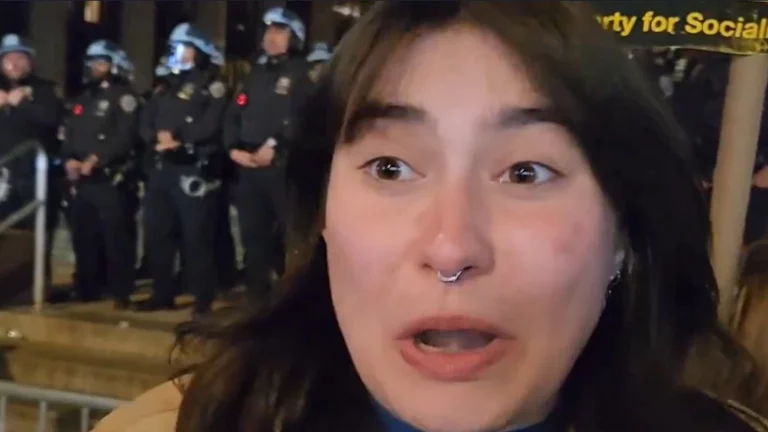 Israel came to a standstill on Monday as people stopped in their tracks for a two-minute siren that wailed across the country in remembrance of the Holocaust’s 6 million Jewish victims.
Israel came to a standstill on Monday as people stopped in their tracks for a two-minute siren that wailed across the country in remembrance of the Holocaust’s 6 million Jewish victims.
The ritual is the centerpiece of Israel’s annual Holocaust Remembrance Day for those who were systematically killed by Nazi Germany and its collaborators during World War II. Pedestrians stood in place, buses stopped on busy streets and cars pulled over on major highways — their drivers standing on the roads with their heads bowed.
In homes and businesses, people stopped what they were doing to pay homage to the victims of the Nazi genocide, in which a third of world Jewry was annihilated.
A wreath laying ceremony at the Yad Vashem Holocaust memorial followed, with Israeli leaders and Holocaust survivors in attendance. A public reading of names also took place in Israel’s parliament, where Prime Minister Benjamin Netanyahu and other leaders recited names of relatives who were killed. Other ceremonies, prayers and musical performances took place in schools, community centers and army bases around the country.
The annual remembrance is one of the most solemn days on Israel’s calendar. Restaurants, cafes and places of entertainment shut down, and radio and TV programs are dedicated almost exclusively to documentaries about the Holocaust, interviews with survivors and somber music. The Israeli flag flew at half-staff.
Israel was established in 1948, just three years after the end of the war, and hundreds of thousands of survivors fled there. Some 160,000 elderly survivors remain, with a similar number worldwide. With the passing years, and the dwindling in numbers of survivors, greater emphasis has been put on commemorating their individual stories.
The central theme of this year’s commemorations at Yad Vashem is “Restoring Their Identities: The Fate of the Individual During the Holocaust.”
The Holocaust memorial called on the public to share testimony and provide more names of those who perished. To date, Yad Vashem’s Shoah Victims’ Names Project has collected over 4,700,000 names of the victims.
“It is a race against the clock to collect as many names of those murdered during the Holocaust before there are no more survivors left,” said Alexander Avram, the director of Vad Vashem’s Hall of Names.
At the opening ceremony on Sunday night, Netanyahu spoke about what he said was the world’s indifference to the genocide of the Jews in World War II and how Israel is the guarantee the Jewish people will never be that weak again.
“The lesson is that we must be able to defend ourselves by ourselves, against every threat, against every enemy,” he said.
President Reuven Rivlin took a different approach. He said although the Holocaust is “permanently branded in our flesh” it “is not the lens through which we should examine our past and our future.”
(AP)






8 Responses
Do they really think that the 2 minute standing like idiots do anything for the souls killed al kiddush Hashem?
Had they included it on Tisha b’Av when klal yisroel is anyhow mourning, they’d have accomplished something and both religious and secular Jews would have mourned the 6 million kedoshim together with churban beis hamikdsah and many would have even said kaddish. But of course, the secular zionist wouldn’t want to be caught doing something religious, hence these 2 minutes standing dumb.
“standing like idiots”
Arye, you have already proven that there is no bigger idiot than you and your fellow satmar haters. I guess it just doesn’t occur to you that not everyone is interested in your distorted satmar BS. There is NOTHING wrong with taking 2 minutes a year and remembering those lost, including my grandparents and most of their families. In regard to your tisha b’av comment, trust me, hardly anyone, especially you, would think about the kedoshim or one second, let alone 2 minutes.
the 2 minute siren is not meant to do anything for the souls
but is meant for awareness
and during the 2 minutes
anybody can say tehillim
or anything else or do nothing
instead of criticizing
please tell us what you do on tisha bav re the kedoishim?
Arye;,
Why are you comparing half of klal Yisroel to idiots?
Maybe that’s the problem.
If you really feel strongly about what you said, could you please re-phrase it in a more positive way.
(Half of klal Yisroel in one sentence …)
Open request to the moderator:
While browsing thru different articles regarding Israel, it is blatantly obvious that “Arye” has nothing nice to say about our country. I am sure that there are many people here who are sick and tired of his hateful satmar rhetoric. In the name of all of us, I request that you stop posting his comments. My parents A’H were survivors, who lost most or all of their parents and siblings and I find it offensive to read what this moron has to say.
Thank you.
arye is in fact a moron
who just repeats what he has been hearing from his rabeim
as i did
who instead of being focused on chumash rashi gemara etc
felt the need to bash israel all the time and of course bash yad vashem
im still waiting for dr wikler to give us his annual bash against yad vashem
and my answer to him and all the bashers are
make your own if you are not satisfied as to what they did
so far besides project witness (great great job but very late in the game)
the charedim have not done much
Rabbi Eliezer Melamed
Q: Rabbi, what is the appropriate way to commemorate Yom Ha-Sho’a?
A: In 1959, the Knesset legislated that the 27th of Nisan shall be Martyrs’ and Heroes’ Remembrance Day:
“To meditate on the memory of the Holocaust, which the Nazis and their collaborators perpetrated against the Jewish people and of the acts of heroism and revolt performed in those days.… Throughout the state shall be a two-minute silence, during which all work and all road traffic shall be suspended; there shall be memorial gatherings, popular rallies, and commemorative functions in army camps and educational institutions; flags on public buildings shall be flown at half-mast; broadcasts shall express the special character of the day.The two minutes of silence take place at 11:00 a.m., after which the official ceremonies begin.”
However, unlike Yom Ha-zikaron, to which the Chief Rabbinate consented, the Torah sages at the time objected to the establishment of this Remembrance Day (commonly known as Yom Ha-Sho’a) on the 27th of Nisan. After all, the month of Nisan is a time of joy, as evidenced by the halakha that one does not recite Tachanun or establish a public fast day during the entire month of Nisan (SA 429:2). In addition, we refrain from delivering eulogies and saying memorial prayers throughout the month (MB 429:8). Many even have a custom not to visit cemeteries in Nisan, and one whose relative’s yahrzeit is in Nisan is instructed to visit the grave the day before the month begins. Therefore, it is clearly inappropriate to institute, in the month of Nisan, a memorial day for the souls of the martyrs who were murdered in the Holocaust. Rather, the proper time to remember the Holocaust is on the fast days that have already been established in commemoration of the destruction of the Holy Temple, especially Tisha Be-Av. Indeed, the Chief Rabbinate established the fast of Asara Be-Tevet as a day of general mourning (Yom Ha-Kaddish Ha-klali) over the souls of the holy martyrs who were killed in the Holocaust, whose date of death is unknown.
It seems to me that the way to endow the 27th of Nisan with some sort of appropriate character nonetheless, is to establish it as a day on which to focus on cultivating the concept of the Jewish family. Undoubtedly, the last request of the six million who were tortured and killed in cruel and unusual ways was that the Jewish people should continue to live, multiply, and grow. They surely hoped that the terrible suffering that our nation underwent for thousands of years, especially during the Holocaust, should not be for naught, and that every surviving Jew should do everything in his or her power to marry, bear children, and continue the legacy, in order to fulfill the verse “The more they were oppressed, the more they increased and spread out” (Shemot 1:12).
Therefore, it is appropriate for public figures to convene on this day and formulate ways to encourage marriage and procreation, while teachers should speak about the great responsibility that we – those who escaped from the sword – bear, to ensure the continued existence and growth of the Jewish nation.
This holds true for the siren. When the siren wails on Yom Ha-Sho’a, we should think about how to promote the development of the Jewish nation, in memory of the victims of the Holocaust. Then, our participation in this practice will not be an expression of mourning or memorializing the deceased, but an expression of rebirth and revival, which is appropriate for the month of Nisan. Furthermore, such thoughts would not be considered wasting time that could be used for Torah study. In any event, even one who does not have these thoughts in mind should not separate himself from the community.
With God’s help, our judges will soon be restored as of old. When this occurs, we will pose this question to them, and they will instruct us how and when it is appropriate to memorialize the holy martyrs.
I know many Holocaust survivors here in EY (most of whom are unfortunately no longer with us) who felt just as insulted by the siren as some felt it meaningful.
The truth is that the way in which Holocaust survivors were at first treated here by the Zionist establishment was reprehensible. The attitude toward them was, we don’t want to hear your stories, you should have stood up for yourselves and fought, we don’t want to be like you. Anyone who has seen the documentary about Eichmann’s trial can remember the survivors who talked about that painful experience.
The siren was purposely set for the day of the Warsaw ghetto uprising, because that was what the establishment valued: physical resistance, not the sacrifice al kiddush Hashem and not the horrific experiences the survivors had.
That was – and still is – the problem with Yad Vashem. There is no attention or value attached to the resistance of the Jewish soul.
Those like me who ignore the siren or feel that it is inappropriate are not disrespecting the kedoshim; they are saying that the siren does not speak for them. That said, anyone who finds him or herself in a neighborhood/shopping center/street, whatever, where the culture does respect the siren and the people will be offended by one who doesn’t stop, should absolutely and without question stop.